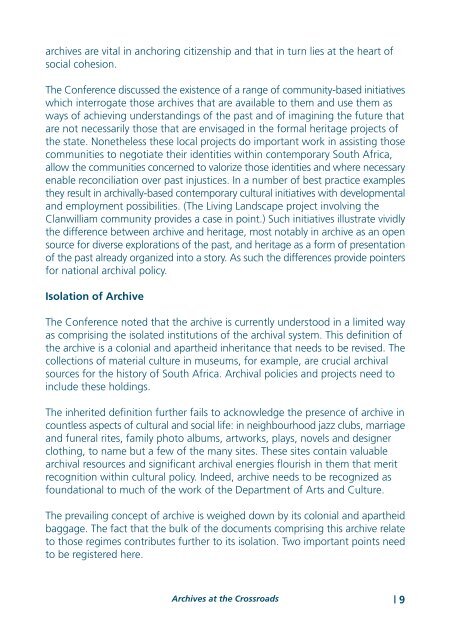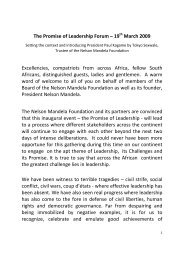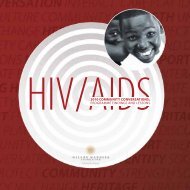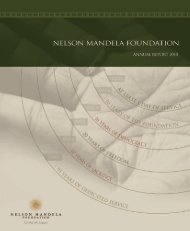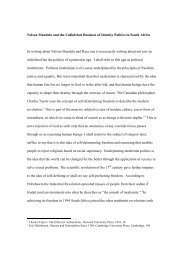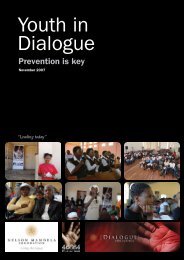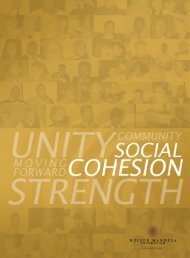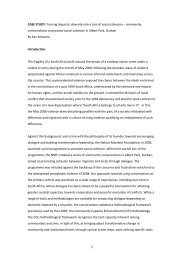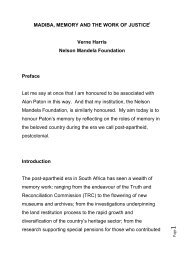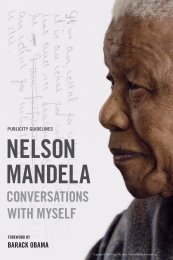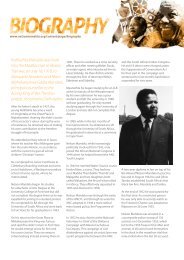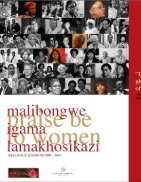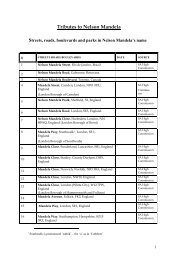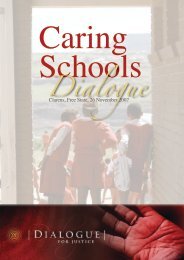Archives at the Crossroads 2007 - Nelson Mandela Foundation
Archives at the Crossroads 2007 - Nelson Mandela Foundation
Archives at the Crossroads 2007 - Nelson Mandela Foundation
- No tags were found...
You also want an ePaper? Increase the reach of your titles
YUMPU automatically turns print PDFs into web optimized ePapers that Google loves.
archives are vital in anchoring citizenship and th<strong>at</strong> in turn lies <strong>at</strong> <strong>the</strong> heart ofsocial cohesion.The Conference discussed <strong>the</strong> existence of a range of community-based initi<strong>at</strong>iveswhich interrog<strong>at</strong>e those archives th<strong>at</strong> are available to <strong>the</strong>m and use <strong>the</strong>m asways of achieving understandings of <strong>the</strong> past and of imagining <strong>the</strong> future th<strong>at</strong>are not necessarily those th<strong>at</strong> are envisaged in <strong>the</strong> formal heritage projects of<strong>the</strong> st<strong>at</strong>e. None<strong>the</strong>less <strong>the</strong>se local projects do important work in assisting thosecommunities to negoti<strong>at</strong>e <strong>the</strong>ir identities within contemporary South Africa,allow <strong>the</strong> communities concerned to valorize those identities and where necessaryenable reconcili<strong>at</strong>ion over past injustices. In a number of best practice examples<strong>the</strong>y result in archivally-based contemporary cultural initi<strong>at</strong>ives with developmentaland employment possibilities. (The Living Landscape project involving <strong>the</strong>Clanwilliam community provides a case in point.) Such initi<strong>at</strong>ives illustr<strong>at</strong>e vividly<strong>the</strong> difference between archive and heritage, most notably in archive as an opensource for diverse explor<strong>at</strong>ions of <strong>the</strong> past, and heritage as a form of present<strong>at</strong>ionof <strong>the</strong> past already organized into a story. As such <strong>the</strong> differences provide pointersfor n<strong>at</strong>ional archival policy.Isol<strong>at</strong>ion of ArchiveThe Conference noted th<strong>at</strong> <strong>the</strong> archive is currently understood in a limited wayas comprising <strong>the</strong> isol<strong>at</strong>ed institutions of <strong>the</strong> archival system. This definition of<strong>the</strong> archive is a colonial and apar<strong>the</strong>id inheritance th<strong>at</strong> needs to be revised. Thecollections of m<strong>at</strong>erial culture in museums, for example, are crucial archivalsources for <strong>the</strong> history of South Africa. Archival policies and projects need toinclude <strong>the</strong>se holdings.The inherited definition fur<strong>the</strong>r fails to acknowledge <strong>the</strong> presence of archive incountless aspects of cultural and social life: in neighbourhood jazz clubs, marriageand funeral rites, family photo albums, artworks, plays, novels and designerclothing, to name but a few of <strong>the</strong> many sites. These sites contain valuablearchival resources and significant archival energies flourish in <strong>the</strong>m th<strong>at</strong> meritrecognition within cultural policy. Indeed, archive needs to be recognized asfound<strong>at</strong>ional to much of <strong>the</strong> work of <strong>the</strong> Department of Arts and Culture.The prevailing concept of archive is weighed down by its colonial and apar<strong>the</strong>idbaggage. The fact th<strong>at</strong> <strong>the</strong> bulk of <strong>the</strong> documents comprising this archive rel<strong>at</strong>eto those regimes contributes fur<strong>the</strong>r to its isol<strong>at</strong>ion. Two important points needto be registered here.<strong>Archives</strong> <strong>at</strong> <strong>the</strong> <strong>Crossroads</strong> | 9


